Lisbon Treaty and EU Democracy
VerifiedAdded on 2020/05/28
|7
|2335
|50
AI Summary
This assignment analyzes the Lisbon Treaty's influence on European Union democracy. It examines the treaty's procedural and conditional requirements for citizens engaging with European legislature, while acknowledging that its actual impact depends on legal implementation and public deliberation. The analysis explores the concept of participatory governance as proposed by the treaty, emphasizing the need for receptive institutions and active citizen involvement in shaping EU policy. The conclusion suggests that while participatory mechanisms are valuable, they alone cannot fully enhance EU democracy, requiring complementary measures like political representation and direct participation.
Contribute Materials
Your contribution can guide someone’s learning journey. Share your
documents today.

“Provisions on Democratic Principles”of
the Lisbon Treaty offer a way to alleviate
the EU’s democratic deficit?
Student Name: Student ID:
Subject Name: Subject ID:
Date Due: Professor Name:
Page | 1
the Lisbon Treaty offer a way to alleviate
the EU’s democratic deficit?
Student Name: Student ID:
Subject Name: Subject ID:
Date Due: Professor Name:
Page | 1
Secure Best Marks with AI Grader
Need help grading? Try our AI Grader for instant feedback on your assignments.
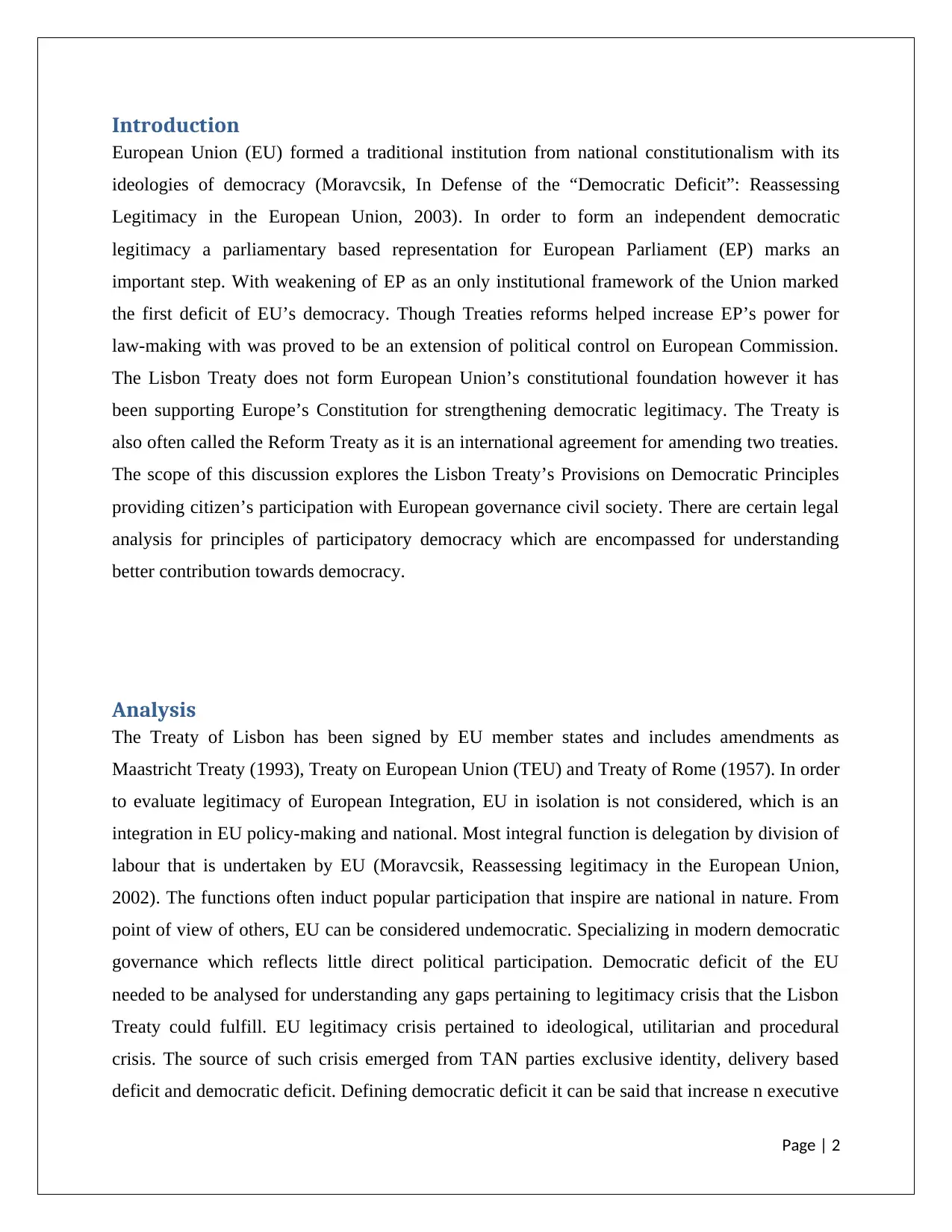
Introduction
European Union (EU) formed a traditional institution from national constitutionalism with its
ideologies of democracy (Moravcsik, In Defense of the “Democratic Deficit”: Reassessing
Legitimacy in the European Union, 2003). In order to form an independent democratic
legitimacy a parliamentary based representation for European Parliament (EP) marks an
important step. With weakening of EP as an only institutional framework of the Union marked
the first deficit of EU’s democracy. Though Treaties reforms helped increase EP’s power for
law-making with was proved to be an extension of political control on European Commission.
The Lisbon Treaty does not form European Union’s constitutional foundation however it has
been supporting Europe’s Constitution for strengthening democratic legitimacy. The Treaty is
also often called the Reform Treaty as it is an international agreement for amending two treaties.
The scope of this discussion explores the Lisbon Treaty’s Provisions on Democratic Principles
providing citizen’s participation with European governance civil society. There are certain legal
analysis for principles of participatory democracy which are encompassed for understanding
better contribution towards democracy.
Analysis
The Treaty of Lisbon has been signed by EU member states and includes amendments as
Maastricht Treaty (1993), Treaty on European Union (TEU) and Treaty of Rome (1957). In order
to evaluate legitimacy of European Integration, EU in isolation is not considered, which is an
integration in EU policy-making and national. Most integral function is delegation by division of
labour that is undertaken by EU (Moravcsik, Reassessing legitimacy in the European Union,
2002). The functions often induct popular participation that inspire are national in nature. From
point of view of others, EU can be considered undemocratic. Specializing in modern democratic
governance which reflects little direct political participation. Democratic deficit of the EU
needed to be analysed for understanding any gaps pertaining to legitimacy crisis that the Lisbon
Treaty could fulfill. EU legitimacy crisis pertained to ideological, utilitarian and procedural
crisis. The source of such crisis emerged from TAN parties exclusive identity, delivery based
deficit and democratic deficit. Defining democratic deficit it can be said that increase n executive
Page | 2
European Union (EU) formed a traditional institution from national constitutionalism with its
ideologies of democracy (Moravcsik, In Defense of the “Democratic Deficit”: Reassessing
Legitimacy in the European Union, 2003). In order to form an independent democratic
legitimacy a parliamentary based representation for European Parliament (EP) marks an
important step. With weakening of EP as an only institutional framework of the Union marked
the first deficit of EU’s democracy. Though Treaties reforms helped increase EP’s power for
law-making with was proved to be an extension of political control on European Commission.
The Lisbon Treaty does not form European Union’s constitutional foundation however it has
been supporting Europe’s Constitution for strengthening democratic legitimacy. The Treaty is
also often called the Reform Treaty as it is an international agreement for amending two treaties.
The scope of this discussion explores the Lisbon Treaty’s Provisions on Democratic Principles
providing citizen’s participation with European governance civil society. There are certain legal
analysis for principles of participatory democracy which are encompassed for understanding
better contribution towards democracy.
Analysis
The Treaty of Lisbon has been signed by EU member states and includes amendments as
Maastricht Treaty (1993), Treaty on European Union (TEU) and Treaty of Rome (1957). In order
to evaluate legitimacy of European Integration, EU in isolation is not considered, which is an
integration in EU policy-making and national. Most integral function is delegation by division of
labour that is undertaken by EU (Moravcsik, Reassessing legitimacy in the European Union,
2002). The functions often induct popular participation that inspire are national in nature. From
point of view of others, EU can be considered undemocratic. Specializing in modern democratic
governance which reflects little direct political participation. Democratic deficit of the EU
needed to be analysed for understanding any gaps pertaining to legitimacy crisis that the Lisbon
Treaty could fulfill. EU legitimacy crisis pertained to ideological, utilitarian and procedural
crisis. The source of such crisis emerged from TAN parties exclusive identity, delivery based
deficit and democratic deficit. Defining democratic deficit it can be said that increase n executive
Page | 2
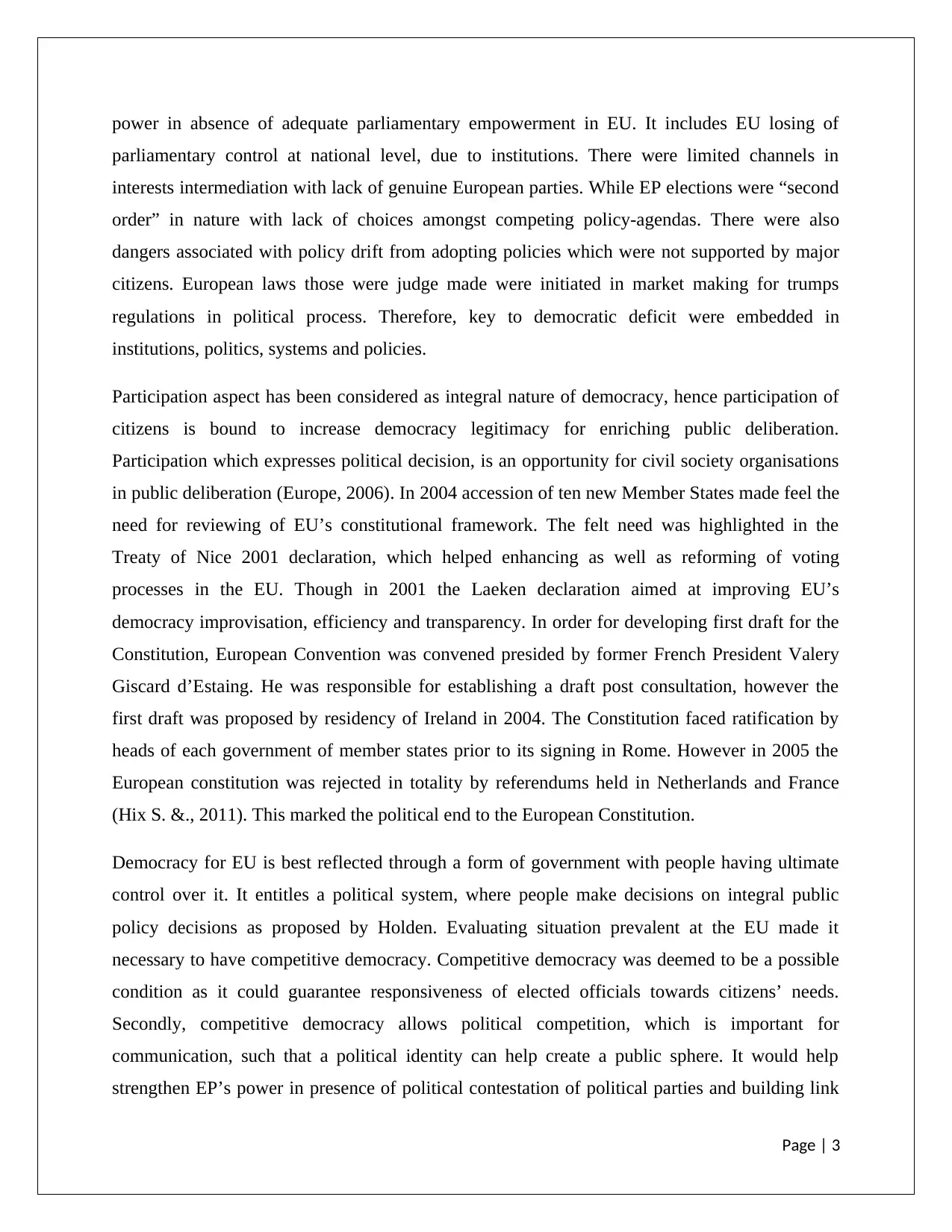
power in absence of adequate parliamentary empowerment in EU. It includes EU losing of
parliamentary control at national level, due to institutions. There were limited channels in
interests intermediation with lack of genuine European parties. While EP elections were “second
order” in nature with lack of choices amongst competing policy-agendas. There were also
dangers associated with policy drift from adopting policies which were not supported by major
citizens. European laws those were judge made were initiated in market making for trumps
regulations in political process. Therefore, key to democratic deficit were embedded in
institutions, politics, systems and policies.
Participation aspect has been considered as integral nature of democracy, hence participation of
citizens is bound to increase democracy legitimacy for enriching public deliberation.
Participation which expresses political decision, is an opportunity for civil society organisations
in public deliberation (Europe, 2006). In 2004 accession of ten new Member States made feel the
need for reviewing of EU’s constitutional framework. The felt need was highlighted in the
Treaty of Nice 2001 declaration, which helped enhancing as well as reforming of voting
processes in the EU. Though in 2001 the Laeken declaration aimed at improving EU’s
democracy improvisation, efficiency and transparency. In order for developing first draft for the
Constitution, European Convention was convened presided by former French President Valery
Giscard d’Estaing. He was responsible for establishing a draft post consultation, however the
first draft was proposed by residency of Ireland in 2004. The Constitution faced ratification by
heads of each government of member states prior to its signing in Rome. However in 2005 the
European constitution was rejected in totality by referendums held in Netherlands and France
(Hix S. &., 2011). This marked the political end to the European Constitution.
Democracy for EU is best reflected through a form of government with people having ultimate
control over it. It entitles a political system, where people make decisions on integral public
policy decisions as proposed by Holden. Evaluating situation prevalent at the EU made it
necessary to have competitive democracy. Competitive democracy was deemed to be a possible
condition as it could guarantee responsiveness of elected officials towards citizens’ needs.
Secondly, competitive democracy allows political competition, which is important for
communication, such that a political identity can help create a public sphere. It would help
strengthen EP’s power in presence of political contestation of political parties and building link
Page | 3
parliamentary control at national level, due to institutions. There were limited channels in
interests intermediation with lack of genuine European parties. While EP elections were “second
order” in nature with lack of choices amongst competing policy-agendas. There were also
dangers associated with policy drift from adopting policies which were not supported by major
citizens. European laws those were judge made were initiated in market making for trumps
regulations in political process. Therefore, key to democratic deficit were embedded in
institutions, politics, systems and policies.
Participation aspect has been considered as integral nature of democracy, hence participation of
citizens is bound to increase democracy legitimacy for enriching public deliberation.
Participation which expresses political decision, is an opportunity for civil society organisations
in public deliberation (Europe, 2006). In 2004 accession of ten new Member States made feel the
need for reviewing of EU’s constitutional framework. The felt need was highlighted in the
Treaty of Nice 2001 declaration, which helped enhancing as well as reforming of voting
processes in the EU. Though in 2001 the Laeken declaration aimed at improving EU’s
democracy improvisation, efficiency and transparency. In order for developing first draft for the
Constitution, European Convention was convened presided by former French President Valery
Giscard d’Estaing. He was responsible for establishing a draft post consultation, however the
first draft was proposed by residency of Ireland in 2004. The Constitution faced ratification by
heads of each government of member states prior to its signing in Rome. However in 2005 the
European constitution was rejected in totality by referendums held in Netherlands and France
(Hix S. &., 2011). This marked the political end to the European Constitution.
Democracy for EU is best reflected through a form of government with people having ultimate
control over it. It entitles a political system, where people make decisions on integral public
policy decisions as proposed by Holden. Evaluating situation prevalent at the EU made it
necessary to have competitive democracy. Competitive democracy was deemed to be a possible
condition as it could guarantee responsiveness of elected officials towards citizens’ needs.
Secondly, competitive democracy allows political competition, which is important for
communication, such that a political identity can help create a public sphere. It would help
strengthen EP’s power in presence of political contestation of political parties and building link
Page | 3
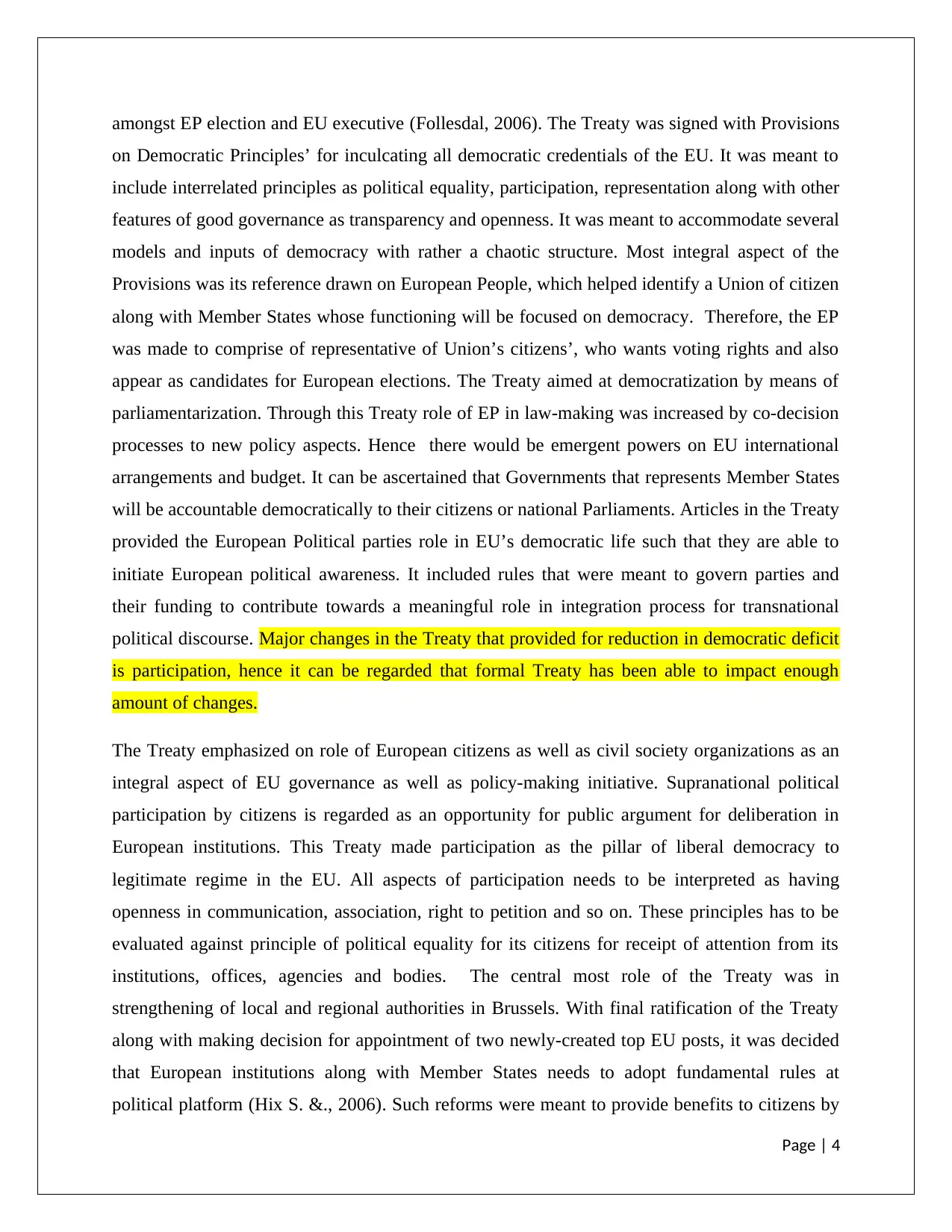
amongst EP election and EU executive (Follesdal, 2006). The Treaty was signed with Provisions
on Democratic Principles’ for inculcating all democratic credentials of the EU. It was meant to
include interrelated principles as political equality, participation, representation along with other
features of good governance as transparency and openness. It was meant to accommodate several
models and inputs of democracy with rather a chaotic structure. Most integral aspect of the
Provisions was its reference drawn on European People, which helped identify a Union of citizen
along with Member States whose functioning will be focused on democracy. Therefore, the EP
was made to comprise of representative of Union’s citizens’, who wants voting rights and also
appear as candidates for European elections. The Treaty aimed at democratization by means of
parliamentarization. Through this Treaty role of EP in law-making was increased by co-decision
processes to new policy aspects. Hence there would be emergent powers on EU international
arrangements and budget. It can be ascertained that Governments that represents Member States
will be accountable democratically to their citizens or national Parliaments. Articles in the Treaty
provided the European Political parties role in EU’s democratic life such that they are able to
initiate European political awareness. It included rules that were meant to govern parties and
their funding to contribute towards a meaningful role in integration process for transnational
political discourse. Major changes in the Treaty that provided for reduction in democratic deficit
is participation, hence it can be regarded that formal Treaty has been able to impact enough
amount of changes.
The Treaty emphasized on role of European citizens as well as civil society organizations as an
integral aspect of EU governance as well as policy-making initiative. Supranational political
participation by citizens is regarded as an opportunity for public argument for deliberation in
European institutions. This Treaty made participation as the pillar of liberal democracy to
legitimate regime in the EU. All aspects of participation needs to be interpreted as having
openness in communication, association, right to petition and so on. These principles has to be
evaluated against principle of political equality for its citizens for receipt of attention from its
institutions, offices, agencies and bodies. The central most role of the Treaty was in
strengthening of local and regional authorities in Brussels. With final ratification of the Treaty
along with making decision for appointment of two newly-created top EU posts, it was decided
that European institutions along with Member States needs to adopt fundamental rules at
political platform (Hix S. &., 2006). Such reforms were meant to provide benefits to citizens by
Page | 4
on Democratic Principles’ for inculcating all democratic credentials of the EU. It was meant to
include interrelated principles as political equality, participation, representation along with other
features of good governance as transparency and openness. It was meant to accommodate several
models and inputs of democracy with rather a chaotic structure. Most integral aspect of the
Provisions was its reference drawn on European People, which helped identify a Union of citizen
along with Member States whose functioning will be focused on democracy. Therefore, the EP
was made to comprise of representative of Union’s citizens’, who wants voting rights and also
appear as candidates for European elections. The Treaty aimed at democratization by means of
parliamentarization. Through this Treaty role of EP in law-making was increased by co-decision
processes to new policy aspects. Hence there would be emergent powers on EU international
arrangements and budget. It can be ascertained that Governments that represents Member States
will be accountable democratically to their citizens or national Parliaments. Articles in the Treaty
provided the European Political parties role in EU’s democratic life such that they are able to
initiate European political awareness. It included rules that were meant to govern parties and
their funding to contribute towards a meaningful role in integration process for transnational
political discourse. Major changes in the Treaty that provided for reduction in democratic deficit
is participation, hence it can be regarded that formal Treaty has been able to impact enough
amount of changes.
The Treaty emphasized on role of European citizens as well as civil society organizations as an
integral aspect of EU governance as well as policy-making initiative. Supranational political
participation by citizens is regarded as an opportunity for public argument for deliberation in
European institutions. This Treaty made participation as the pillar of liberal democracy to
legitimate regime in the EU. All aspects of participation needs to be interpreted as having
openness in communication, association, right to petition and so on. These principles has to be
evaluated against principle of political equality for its citizens for receipt of attention from its
institutions, offices, agencies and bodies. The central most role of the Treaty was in
strengthening of local and regional authorities in Brussels. With final ratification of the Treaty
along with making decision for appointment of two newly-created top EU posts, it was decided
that European institutions along with Member States needs to adopt fundamental rules at
political platform (Hix S. &., 2006). Such reforms were meant to provide benefits to citizens by
Page | 4
Secure Best Marks with AI Grader
Need help grading? Try our AI Grader for instant feedback on your assignments.
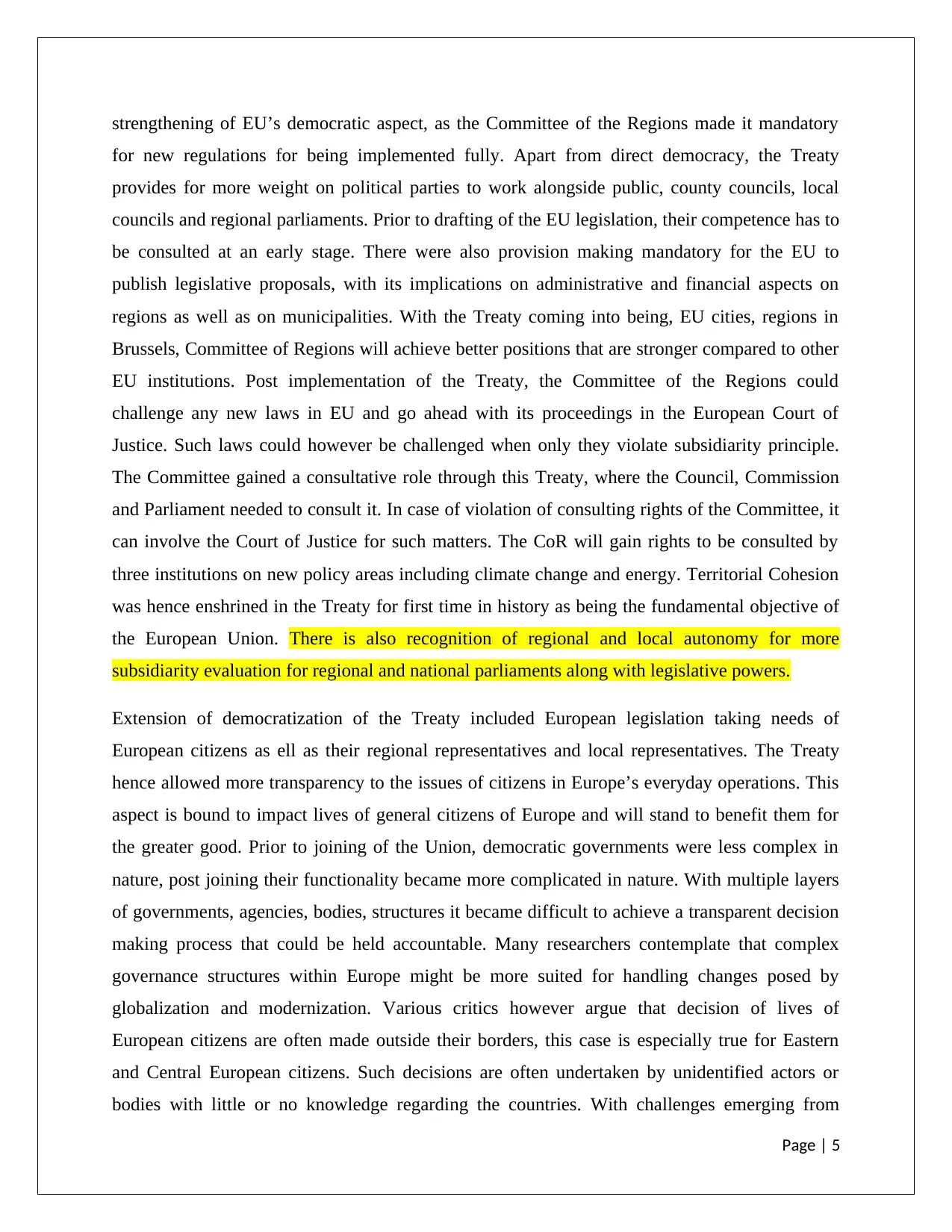
strengthening of EU’s democratic aspect, as the Committee of the Regions made it mandatory
for new regulations for being implemented fully. Apart from direct democracy, the Treaty
provides for more weight on political parties to work alongside public, county councils, local
councils and regional parliaments. Prior to drafting of the EU legislation, their competence has to
be consulted at an early stage. There were also provision making mandatory for the EU to
publish legislative proposals, with its implications on administrative and financial aspects on
regions as well as on municipalities. With the Treaty coming into being, EU cities, regions in
Brussels, Committee of Regions will achieve better positions that are stronger compared to other
EU institutions. Post implementation of the Treaty, the Committee of the Regions could
challenge any new laws in EU and go ahead with its proceedings in the European Court of
Justice. Such laws could however be challenged when only they violate subsidiarity principle.
The Committee gained a consultative role through this Treaty, where the Council, Commission
and Parliament needed to consult it. In case of violation of consulting rights of the Committee, it
can involve the Court of Justice for such matters. The CoR will gain rights to be consulted by
three institutions on new policy areas including climate change and energy. Territorial Cohesion
was hence enshrined in the Treaty for first time in history as being the fundamental objective of
the European Union. There is also recognition of regional and local autonomy for more
subsidiarity evaluation for regional and national parliaments along with legislative powers.
Extension of democratization of the Treaty included European legislation taking needs of
European citizens as ell as their regional representatives and local representatives. The Treaty
hence allowed more transparency to the issues of citizens in Europe’s everyday operations. This
aspect is bound to impact lives of general citizens of Europe and will stand to benefit them for
the greater good. Prior to joining of the Union, democratic governments were less complex in
nature, post joining their functionality became more complicated in nature. With multiple layers
of governments, agencies, bodies, structures it became difficult to achieve a transparent decision
making process that could be held accountable. Many researchers contemplate that complex
governance structures within Europe might be more suited for handling changes posed by
globalization and modernization. Various critics however argue that decision of lives of
European citizens are often made outside their borders, this case is especially true for Eastern
and Central European citizens. Such decisions are often undertaken by unidentified actors or
bodies with little or no knowledge regarding the countries. With challenges emerging from
Page | 5
for new regulations for being implemented fully. Apart from direct democracy, the Treaty
provides for more weight on political parties to work alongside public, county councils, local
councils and regional parliaments. Prior to drafting of the EU legislation, their competence has to
be consulted at an early stage. There were also provision making mandatory for the EU to
publish legislative proposals, with its implications on administrative and financial aspects on
regions as well as on municipalities. With the Treaty coming into being, EU cities, regions in
Brussels, Committee of Regions will achieve better positions that are stronger compared to other
EU institutions. Post implementation of the Treaty, the Committee of the Regions could
challenge any new laws in EU and go ahead with its proceedings in the European Court of
Justice. Such laws could however be challenged when only they violate subsidiarity principle.
The Committee gained a consultative role through this Treaty, where the Council, Commission
and Parliament needed to consult it. In case of violation of consulting rights of the Committee, it
can involve the Court of Justice for such matters. The CoR will gain rights to be consulted by
three institutions on new policy areas including climate change and energy. Territorial Cohesion
was hence enshrined in the Treaty for first time in history as being the fundamental objective of
the European Union. There is also recognition of regional and local autonomy for more
subsidiarity evaluation for regional and national parliaments along with legislative powers.
Extension of democratization of the Treaty included European legislation taking needs of
European citizens as ell as their regional representatives and local representatives. The Treaty
hence allowed more transparency to the issues of citizens in Europe’s everyday operations. This
aspect is bound to impact lives of general citizens of Europe and will stand to benefit them for
the greater good. Prior to joining of the Union, democratic governments were less complex in
nature, post joining their functionality became more complicated in nature. With multiple layers
of governments, agencies, bodies, structures it became difficult to achieve a transparent decision
making process that could be held accountable. Many researchers contemplate that complex
governance structures within Europe might be more suited for handling changes posed by
globalization and modernization. Various critics however argue that decision of lives of
European citizens are often made outside their borders, this case is especially true for Eastern
and Central European citizens. Such decisions are often undertaken by unidentified actors or
bodies with little or no knowledge regarding the countries. With challenges emerging from
Page | 5
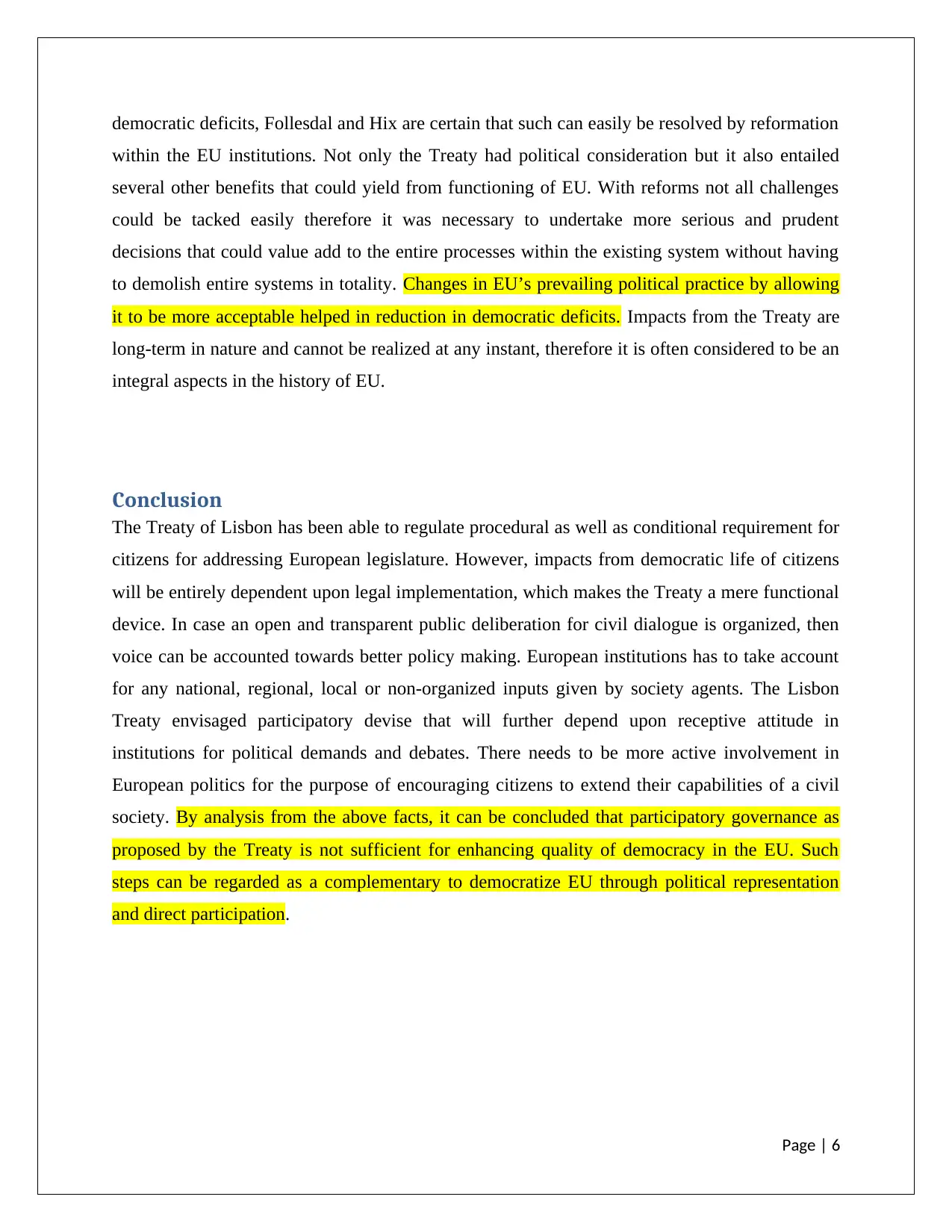
democratic deficits, Follesdal and Hix are certain that such can easily be resolved by reformation
within the EU institutions. Not only the Treaty had political consideration but it also entailed
several other benefits that could yield from functioning of EU. With reforms not all challenges
could be tacked easily therefore it was necessary to undertake more serious and prudent
decisions that could value add to the entire processes within the existing system without having
to demolish entire systems in totality. Changes in EU’s prevailing political practice by allowing
it to be more acceptable helped in reduction in democratic deficits. Impacts from the Treaty are
long-term in nature and cannot be realized at any instant, therefore it is often considered to be an
integral aspects in the history of EU.
Conclusion
The Treaty of Lisbon has been able to regulate procedural as well as conditional requirement for
citizens for addressing European legislature. However, impacts from democratic life of citizens
will be entirely dependent upon legal implementation, which makes the Treaty a mere functional
device. In case an open and transparent public deliberation for civil dialogue is organized, then
voice can be accounted towards better policy making. European institutions has to take account
for any national, regional, local or non-organized inputs given by society agents. The Lisbon
Treaty envisaged participatory devise that will further depend upon receptive attitude in
institutions for political demands and debates. There needs to be more active involvement in
European politics for the purpose of encouraging citizens to extend their capabilities of a civil
society. By analysis from the above facts, it can be concluded that participatory governance as
proposed by the Treaty is not sufficient for enhancing quality of democracy in the EU. Such
steps can be regarded as a complementary to democratize EU through political representation
and direct participation.
Page | 6
within the EU institutions. Not only the Treaty had political consideration but it also entailed
several other benefits that could yield from functioning of EU. With reforms not all challenges
could be tacked easily therefore it was necessary to undertake more serious and prudent
decisions that could value add to the entire processes within the existing system without having
to demolish entire systems in totality. Changes in EU’s prevailing political practice by allowing
it to be more acceptable helped in reduction in democratic deficits. Impacts from the Treaty are
long-term in nature and cannot be realized at any instant, therefore it is often considered to be an
integral aspects in the history of EU.
Conclusion
The Treaty of Lisbon has been able to regulate procedural as well as conditional requirement for
citizens for addressing European legislature. However, impacts from democratic life of citizens
will be entirely dependent upon legal implementation, which makes the Treaty a mere functional
device. In case an open and transparent public deliberation for civil dialogue is organized, then
voice can be accounted towards better policy making. European institutions has to take account
for any national, regional, local or non-organized inputs given by society agents. The Lisbon
Treaty envisaged participatory devise that will further depend upon receptive attitude in
institutions for political demands and debates. There needs to be more active involvement in
European politics for the purpose of encouraging citizens to extend their capabilities of a civil
society. By analysis from the above facts, it can be concluded that participatory governance as
proposed by the Treaty is not sufficient for enhancing quality of democracy in the EU. Such
steps can be regarded as a complementary to democratize EU through political representation
and direct participation.
Page | 6
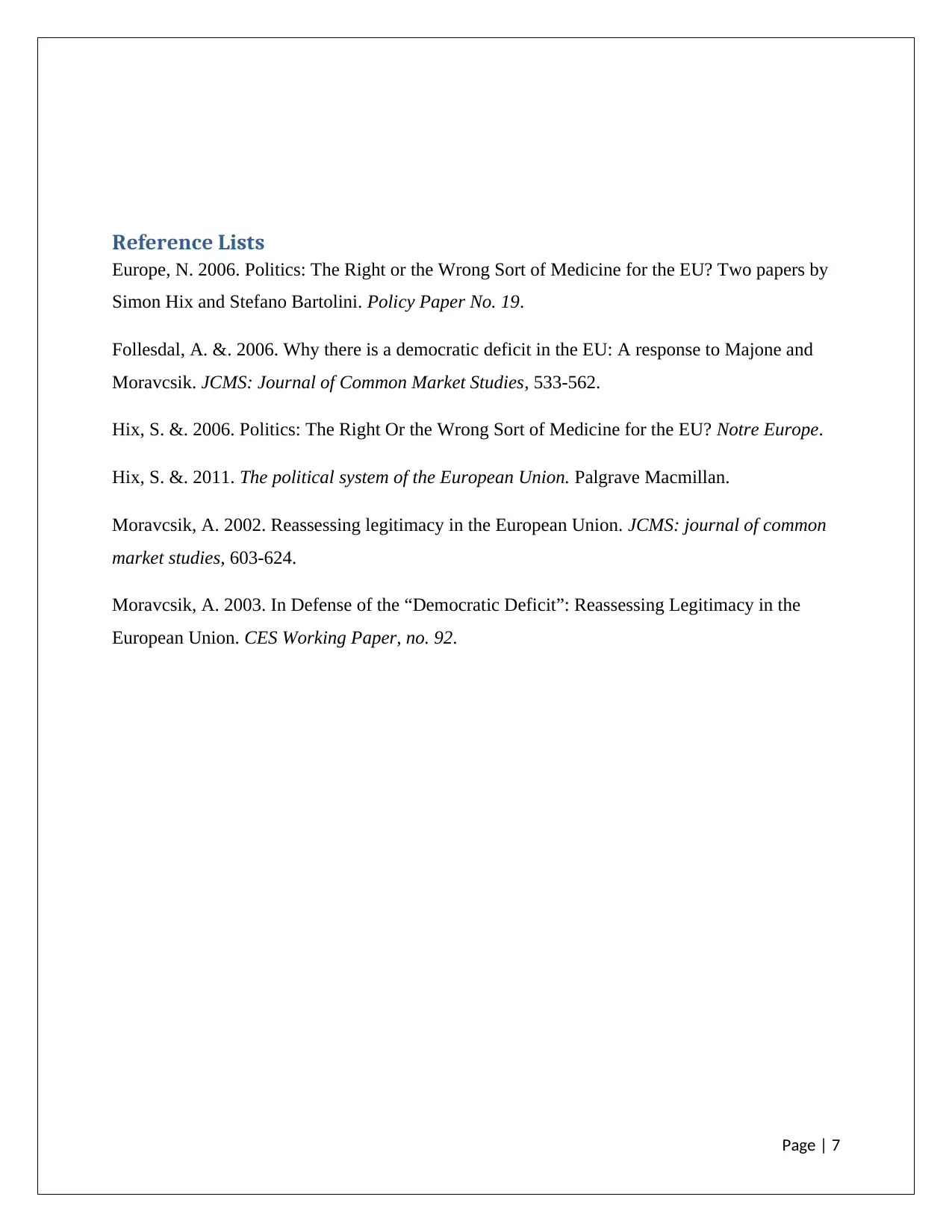
Reference Lists
Europe, N. 2006. Politics: The Right or the Wrong Sort of Medicine for the EU? Two papers by
Simon Hix and Stefano Bartolini. Policy Paper No. 19.
Follesdal, A. &. 2006. Why there is a democratic deficit in the EU: A response to Majone and
Moravcsik. JCMS: Journal of Common Market Studies, 533-562.
Hix, S. &. 2006. Politics: The Right Or the Wrong Sort of Medicine for the EU? Notre Europe.
Hix, S. &. 2011. The political system of the European Union. Palgrave Macmillan.
Moravcsik, A. 2002. Reassessing legitimacy in the European Union. JCMS: journal of common
market studies, 603-624.
Moravcsik, A. 2003. In Defense of the “Democratic Deficit”: Reassessing Legitimacy in the
European Union. CES Working Paper, no. 92.
Page | 7
Europe, N. 2006. Politics: The Right or the Wrong Sort of Medicine for the EU? Two papers by
Simon Hix and Stefano Bartolini. Policy Paper No. 19.
Follesdal, A. &. 2006. Why there is a democratic deficit in the EU: A response to Majone and
Moravcsik. JCMS: Journal of Common Market Studies, 533-562.
Hix, S. &. 2006. Politics: The Right Or the Wrong Sort of Medicine for the EU? Notre Europe.
Hix, S. &. 2011. The political system of the European Union. Palgrave Macmillan.
Moravcsik, A. 2002. Reassessing legitimacy in the European Union. JCMS: journal of common
market studies, 603-624.
Moravcsik, A. 2003. In Defense of the “Democratic Deficit”: Reassessing Legitimacy in the
European Union. CES Working Paper, no. 92.
Page | 7
1 out of 7
Related Documents
Your All-in-One AI-Powered Toolkit for Academic Success.
+13062052269
info@desklib.com
Available 24*7 on WhatsApp / Email
![[object Object]](/_next/static/media/star-bottom.7253800d.svg)
Unlock your academic potential
© 2024 | Zucol Services PVT LTD | All rights reserved.





